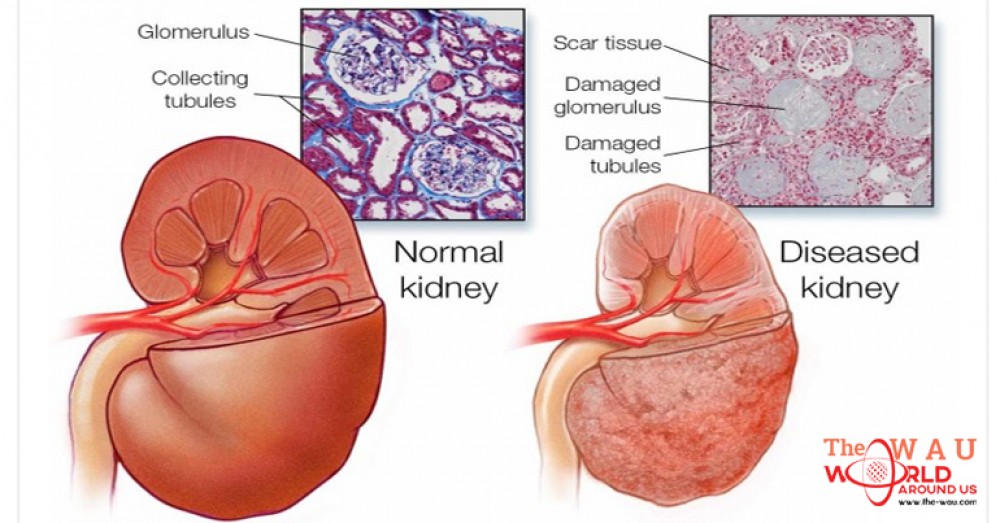Symptoms
Signs and symptoms of chronic kidney disease develop over time if kidney damage progresses slowly. Signs and symptoms of kidney disease may include:
> Nausea
> Vomiting
> Loss of appetite
> Fatigue and weakness
> Sleep problems
> Changes in urine output
> Decreased mental sharpness
> Muscle twitches and cramps
> Hiccups
> Swelling of feet and ankles
> Persistent itching
> Chest pain, if fluid builds up around the lining of the heart
> Shortness of breath, if fluid builds up in the lungs
> High blood pressure (hypertension) that’s difficult to control
Signs and symptoms of kidney disease are often nonspecific, meaning they can also be caused by other illnesses. And because your kidneys are highly adaptable and able to compensate for lost function, signs and symptoms may not appear until irreversible damage has occurred.
Lifestyle and home remedies
As part of your treatment for chronic kidney disease, your doctor may recommend a special diet to help support your kidneys and limit the work they must do. Ask your doctor for a referral to a dietitian who can analyze your current diet and suggest ways to make your diet easier on your kidneys.
Depending on your situation, kidney function and overall health, your dietitian may recommend that you:
> Avoid products with added salt. Lower the amount of sodium you eat each day by avoiding products with added salt, including many convenience foods, such as frozen dinners, canned soups and fast foods. Other foods with added salt include salty snack foods, canned vegetables, and processed meats and cheeses.
> Choose lower potassium foods. Your dietitian may recommend that you choose lower potassium foods at each meal. High-potassium foods include bananas, oranges, potatoes, spinach and tomatoes. Examples of low-potassium foods include apples, cabbage, carrots, green beans, grapes and blueberries. Be aware that many salt substitutes contain potassium, so you should avoid them if you have kidney failure.
> Limit the amount of protein you eat. Your dietitian will estimate the appropriate number of grams of protein you should eat each day and make recommendations based on that amount. High-protein foods include lean meats, eggs, milk, cheese and beans. Low-protein foods include vegetables, fruits, breads and cereals
Coping and support
Receiving a diagnosis of chronic kidney disease can be worrisome. You may be concerned about what your diagnosis means for your future health. To help you cope with your feelings, consider trying to:
Connect with other people who have kidney disease.Other people with chronic kidney disease understand what you’re feeling and can offer unique support. Ask your doctor about support groups in your area. Or contact organizations such as the American Association of Kidney Patients, the National Kidney Foundation or the American Kidney Fund for groups in your area.
Maintain your normal routine, when possible. Try to maintain a normal routine, doing the activities you enjoy and continuing to work, if your condition allows. This may help you cope with feelings of sadness or loss that you may experience after your diagnosis.
Be active most days of the week. With your doctor’s advice, aim for at least 30 minutes of physical activity most days of the week. This can help you cope with fatigue and stress.
Talk with a person you trust. Living with chronic kidney disease can be stressful, and it may help to talk about your feelings. You may have a friend or family member who is a good listener. Or you may find it helpful to talk with a faith leader or someone else you trust. Ask your doctor for a referral to a social worker or counselor.
Prevention
To reduce your risk of chronic kidney disease:
Drink alcohol in moderation, if at all. If you choose to drink alcohol, do so in moderation. For healthy adults, that means no more than one drink a day for women of all ages and men older than 65, and no more than two drinks a day for men 65 and younger.
Follow instructions on over-the-counter medications.When using nonprescription pain relievers, such as aspirin, ibuprofen (Advil, Motrin IB, others) and acetaminophen (Tylenol, others), follow the instructions on the package. Taking too many pain relievers could lead to kidney damage and generally should be avoided if you have kidney disease. Ask your doctor whether these drugs are safe for you.
Maintain a healthy weight. If you’re at a healthy weight, work to maintain it by being physically active most days of the week. If you need to lose weight, talk with your doctor about strategies for healthy weight loss. Often this involves increasing daily physical activity and reducing calories.
Don’t smoke. If you’re a smoker, talk to your doctor about strategies for quitting smoking. Support groups, counseling and medications can all help you to stop.
Manage your medical conditions with your doctor’s help.If you have diseases or conditions that increase your risk of kidney disease, work with your doctor to control them. Ask your doctor about tests to look for signs of kidney damage.
Making the changes I’ve listed above will benefit your kidneys, along with your overall health. But, in addition, there are three significant threats that really require action on your part. If you’re suffering from high blood pressure, pre-diabetes, or diabetes, your kidneys could be suffering, too. These conditions can be improved with natural remedies and lifestyle changes, but those will require some commitment on your part. I hope you’ll agree that taking care of your kidneys is a worthwhile goal and make the necessary changes to protect these vital organs.
Share This Post















